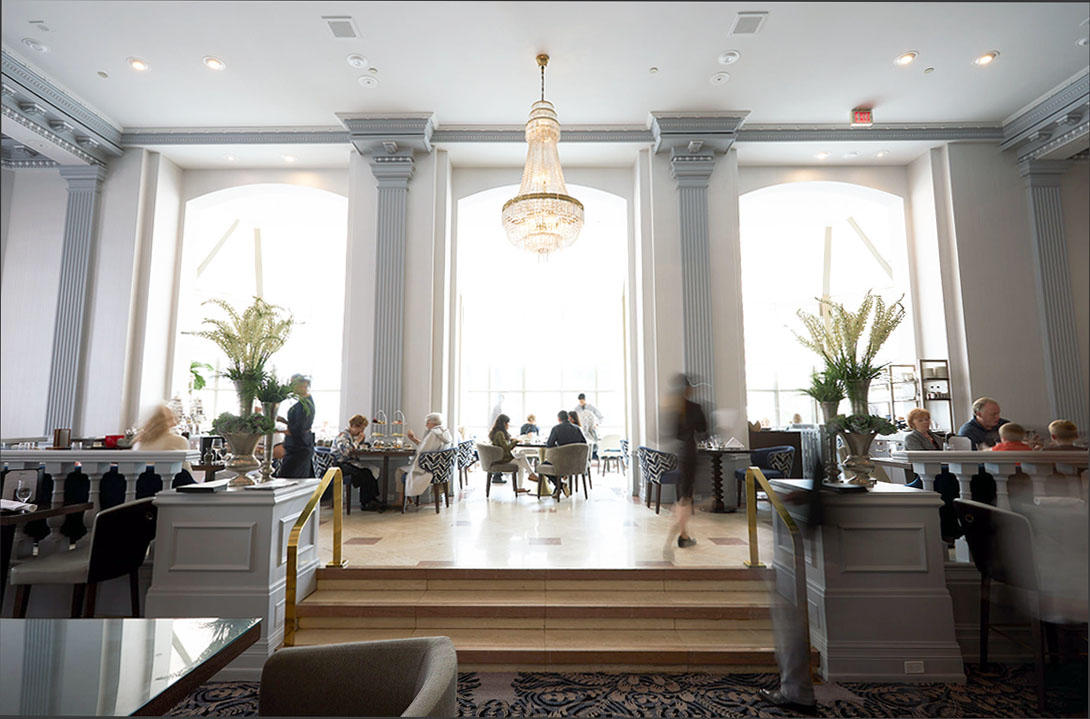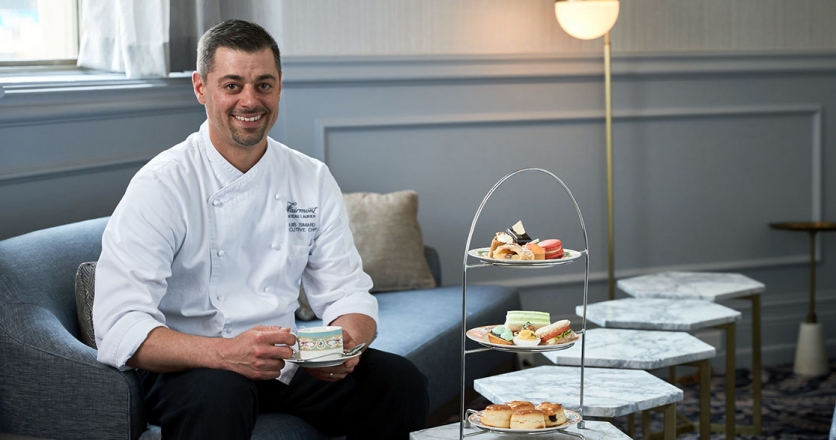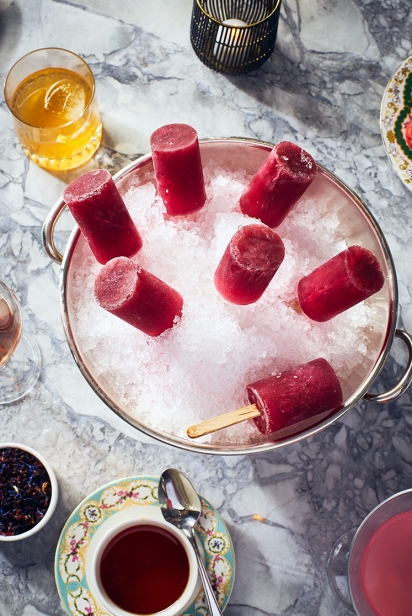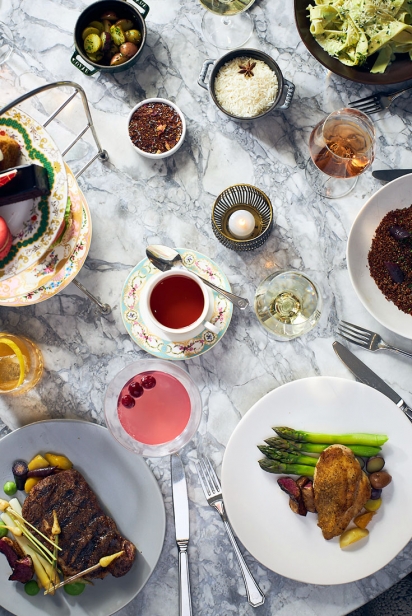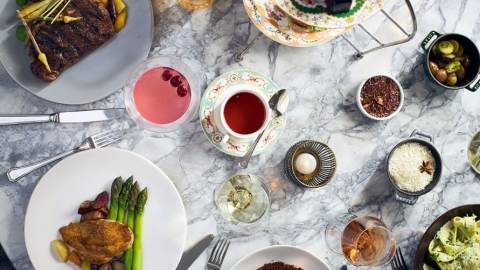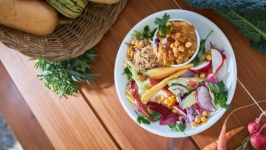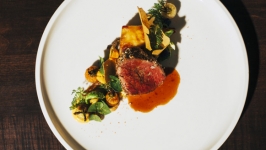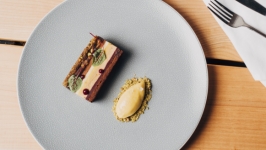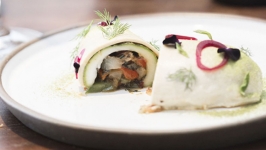Tea Time with Executive Chef Louis Simard of the Fairmont Château Laurier
Tea is not an elitist, according to Louis Simard. Pair it with any food — sweet, sour, rich or light — and you’ll find tea accompanies it all with a charming, democratic ease.
Simard should know. Not only is he the executive chef at the Fairmont Château Laurier, and therefore knows a lot about food, he is also a tea sommelier, one of a growing army of folks whose training means they know a lot about the beverage that we’ve been sipping for millenniums without thinking too much about it — except that it tastes good.
“What I like about the tea sommelier versus the wine sommelier, there’s no tea sommelier snobs,” says Simard. “It seems tea is gaining so much popularity and momentum; it’s exponential. You’re just happy to share what you know about it. Not all wine sommeliers are snobs, but it’s a stereotype. Tea would be more [about] sharing.”
He also gets a professional rush out of tea’s countless varieties and blends. “Being surrounded by so many different flavours, as a chef you enjoy that. It’s like walking in the [ByWard] Market: You don’t eat anything, but you look at the good food around you, you get excited. I feel the same [about] tea.”
Being a chef, Simard had become interested in using tea in his cooking, rather than drinking it (nobody’s idea of a serene guy, he admits he’s more of a coffee dude when it comes to beverages.) He’d also noticed the explosion of tea culture, including the drink’s purported health benefits, when he was working in Vancouver before joining the Château. So when the opportunity arose to do a tea sommelier course through The Metropolitan Tea Company, which supplies the Fairmont chain with its Lot 35 specialty teas, he jumped at it.
Along with other folks from the hotel chain, Simard completed the three-day, entry-level course in 2018 and got his certification as a first-level tea sommelier (other training organizations have different instructional regimens). He says the course is a mix of theory and practice, including blind tea-tasting that, like wine- tasting, involves use of a spit bowl. There are also written tests.
Now, there’s no holding him back when he starts talking tea and food.
Black tea, such as lapsang souchong, makes a great rub for steak and oven-roasted chicken, he says. Dried over wood, the tea gives the meat an enticing smoky flavour, as though it’s been cooked over charcoal. Matcha green tea dresses up pasta alfredo, while trendy rooibos is a must when you’re making stock for rice and other grains.
There are also dessert applications, says Simard, including syrups, as well as summer-y popsicle treats for youngsters. Tea is even used in cocktails at the Château.
One trick to using a tea infusion in cooking is to make it strong, says Simard. That usually means using half the water you’d normally add and letting it steep twice as long.
“I smell it and I want to go start a bunch of cooking,” Simard says.
Reassuring to many of us, he adds that you needn’t be born with an ultra-sensitive palate to be able to differentiate and appreciate teas. Like wine, it’s actually a matter of practice until you’ve trained your brain to recognize what’s what.
Unlike wine, however, tea has “a passing flavour. When you drink tea, after a minute, you don’t taste it anymore; it’s ephemeral. That’s why when you drink tea, you want a whole pot to have that taste again.”
Simard, who disdains most commercial teas as the “dust” that’s left when good-quality tea leaves are processed, isn’t the only tea sommelier at the Château. There are three others and part of their job is to ensure servers at Zoe’s — home to the hotel’s popular afternoon tea with its scones, homemade jams and multigenerational guests — have the scoop on tea. With a list of 21 teas, everything from Mojo Mate, a robust green tea with a spearmint finish, to Ontario Icewine, a white tea with Riesling and berry notes, that knowledge is critical to helping guests choose the right tea for the right food, whether it’s during those afternoon get-togethers or at other times.
Oolong, for instance, pairs well with cheeses and desserts whereas a black tea would go well with red meats and pastas.
One of the things the tea sommeliers teach Château servers is the fine art of questioning. If you take sugar in your coffee, then you’re better choosing a green tea. If you like decaf coffee, there’s a tea equivalent.
There’s also ritual involved for those folks who show up for afternoon tea — some of them wearing fascinators — which has been a staple at the hotel since it opened in the early 1900s. For example, tea is brewed at the table using a timer to get it just right, Simard says.
“To enjoy tea, you don’t take it in a to-go cup and walk around,” he says. “That’s the role of coffee. [Tea is] meant for sitting down and enjoying it, having a conversation, reading a book, reflecting. It has that Zen about it.”
Jessica Hughes gets the differences between coffee and tea. She owns the online Queen of Tea shop and co-founded the Ottawa Tea Guild to connect enthusiasts, promote tea shops and spread the word about the beverage. She is also a certified tea sommelier with the Tea and Herbal Association of Canada.
Tea has become popular in part because “it’s been instrumental in broadening community engagement and even family time — tea with your grandparents or just bringing people together. People are more open to having those kinds of [personal] conversations over a cup of tea than a cup of coffee.”
She says that popularity has translated into a proliferation of online tea shops, afternoon teas and tea-tasting events. Coffee shops in larger cities are opening up their own tea rooms and there are now career opportunities for tea sommeliers with hotels and high-end restaurants.
Hughes, who already held a university degree and college diploma, completed her tea-sommelier training through Algonquin College, which is not currently offering the Tea and Herbal Association of Canada program. She says the program entailed certification exams, including blind taste-testing, which was “rather difficult.”
The association offers its courses online and through some colleges, including Mohawk College in Hamilton and Vancouver Community College. Other colleges, however, have dropped the program because of low enrollment.
Most of the eight courses in the association’s program take six weeks. The total cost for the program, including the certification exam, is $2,500 to $3,500 depending on whether the student takes the course at a college or online. Students take an average of one year to 18 months to complete the program.
Tea training is also available through organizations such as the
International Tea Education Institute. Its offerings, most of them online, include a tea steward course aimed at the hospitality and catering industry. It also offers specialty training such as the Matcha Masterclass for chefs, baristas, nutritionists and others interested in tea’s “culinary and gastronomy applications.”
Louis Simard loves this blossoming attention to tea, but he’s not about to swap his chef’s hat for that of a full-time tea sommelier. “One time, I went in a shrimp boat, but I’m not going to become a fisherman,” he says.
At the same time, “People discovering tea and learning about it — it’s great. The more people are aware of food and tea, I enjoy it. It challenges us. You just keep pushing and pushing.”
Fairmont Château Laurier
1 Rideau St, Ottawa
fairmont.com/laurier-ottawa | 613.241.1414 | @fairmontlaurier


